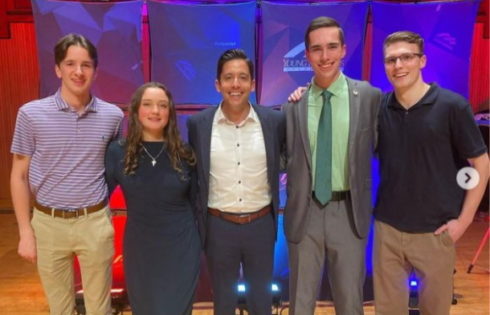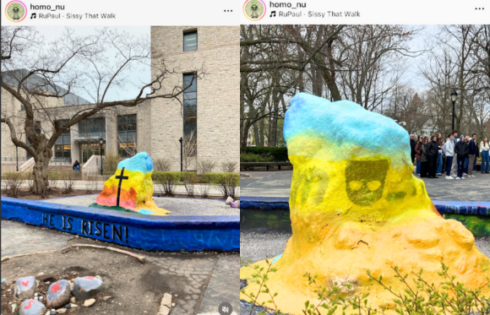
‘The point they seem to be making was that they should not have the right to say it’
Massachusetts Institute of Technology students behind flyers and chalkings recently found at the school that included slurs against LGBTQ people were protesting the university’s emerging policies in support of free speech.
The incident came in the wake of a two-month-old MIT faculty resolution that defends freedom of speech and expression — even speech some find “offensive or injurious.”
A Feb. 23 memo from MIT administrators stated flyers posted across campus and some chalking outside a school entrance “contained slurs directly targeting the LBGTQ+ community.”
MIT’s bias response team investigated, the memo added, and determined “the messages were put up by students choosing to use extreme speech to call attention to and protest what they see as the implications of” several new pro-free speech policies and efforts at the school.
“The chalking and flyers that carried slurs were put up as part of a much larger set of flyers, expressing a wide range of views, many framed in provocative terms. We have been told that these flyers were intended to probe the boundaries of MIT’s commitment to freedom of expression and to determine how this commitment comports with MIT policies, including those on harassment,” stated the memo, written by Dean for Student Life Suzy Nelson and Institute Community and Equity Officer John Dozier.
Peter Bonilla, executive director of the MIT Free Speech Alliance, said he couldn’t say for sure whether the students who posted the messages are left-leaning progressives, but added “whatever the content of the messages, whatever was being said, the point they seem to be making was that they should not have the right to say it.”
From the little MIT administration has released about the content of the flyers and chalkings, “that kind of protest should be protected under MIT’s policies,” Bonilla told The Fix in a telephone interview Thursday.
He said meeting the legal threshold of unprotected speech categories like incitement, targeted harassment and unlawful threats probably could not be met with flyers and chalkings, that “it’s hard for a message posted in that kind of medium to meet that threshold on its own.”
 In an emailed statement to The College Fix on Thursday, MIT spokesperson Kimberly Allen said MIT President Sally Kornbluth (pictured) is calling for a culture of respectful speech that can live alongside a strong endorsement of free expression.
In an emailed statement to The College Fix on Thursday, MIT spokesperson Kimberly Allen said MIT President Sally Kornbluth (pictured) is calling for a culture of respectful speech that can live alongside a strong endorsement of free expression.
Campus leaders “are working on creating a range of different opportunities to engage and inspire individuals across campus to learn about, practice and model the skills to confidently, constructively, respectfully express ourselves – and listen to each other – across differences,” Allen stated.
Asked for details on the content of the flyers and chalkings, Allen stated the university’s full statement on that matter is encompassed in Nelson’s and Dozier’s memo.
The new pro-free speech policies that have upset MIT students and prompted the false flag campaign include the free speech faculty resolution approved in December as well as a final report of the faculty Ad Hoc Working Group on Free Expression.
In the wake of these developments, Kornbluth — who took the helm of MIT on Jan. 1 — stated in a Feb. 16 announcement plans to review the school’s existing policies on academic freedom and free expression and determine “what changes if any may be necessary to bring them in line with” the faculty’s final report.
She also called for creating “a range of different opportunities to engage and inspire all of us, across our community, to learn about, practice and model the skills to confidently, constructively, respectfully express ourselves – and listen to each other – across differences.”
MIT was engulfed in controversy in 2021 for canceling a guest lecture to be given by University of Chicago geophysicist Dorian Abbot.
A report released in mid-January by the Foundation for Individual Rights and Expression also found that “Large portions of MIT faculty and students are afraid to express their views in various academic settings. Faculty and students are at least as afraid of each other as they are of the administration.”
In response to the flyers and chalkings, the MIT Free Speech Alliance stated in a news release
that “protesting against the scope of the free speech protections offered by MIT’s new free expression statement is itself protected expression, and students are well within
their rights to engage in such protest.”
“…Assuming the speech at issue is protected, disciplinary investigations or charges against students over the content of this expression are unwarranted.”
MORE: MIT faculty ‘increasingly afraid to express their views,’ survey finds
IMAGE: Marcio Jose Bastos Silva / Shutterstock
Like The College Fix on Facebook / Follow us on Twitter






Please join the conversation about our stories on Facebook, Twitter, Instagram, Reddit, MeWe, Rumble, Gab, Minds and Gettr.